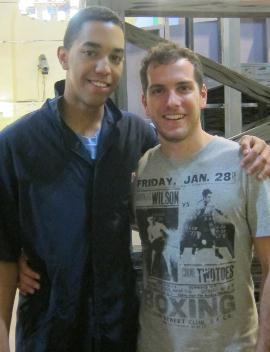At 21, Brandyn Mascall has already performed in 12 musical theatre productions.
Orpheus Musical Theatre Society’s current production of Footloose is his second with the company.
“I have always had this urge since I was young to be someone else,” Mascall says. “Playing characters allowed me to fit in.”
Footloose is about the town of Beaumont, where public dancing is banned. The town’s reverend manages to convince its denizens this is necessary after four teenagers are killed in a car accident.
Mascall, who is gay, is trying something new in a role as one of the show’s antagonists, Lyle, who wants to maintain the status quo and battles the protagonist, Ren McCormack, as he tries to shake up the sleepy town.
It’s a change for Mascall, who had a tough time growing up. “Now I am playing the guy that would have picked on me,” he says.
Mascall says coming out wasn’t easy. “My mom was hard hit. There were some tears, and then a break, then more tears when she thought dreams of marriage and children were over, and then a bit of breaking down stereotypes.”
After later telling his father, Mascall retreated to a friend’s house, where he worried about his family’s negative response. A few hours later he came home to find a note from his mom and dad saying they supported him.
“That was three years ago. Now, they are coming up for the closing night of the show, and they are so excited, they even offered to drive up my extended family and friends in Toronto,” he says, obviously thrilled by their support. “When I was 10 or 11, I was in Joseph and the Amazing Technicolor Dreamcoat and my dad fell asleep. Now he is driving up, taking time off work and cheering me on; it means a lot.”
Mathieu-Philippe Perras, who is playing the lead, Ren McCormack, says Footloose resonates with the queer community. “The story explores the challenging relationships between children and their parents,” he says.
Perras says his own life shares many parallels with McCormack’s.
“Sometimes I feel like we share the same life, with some minor differences. We both struggle with how you can respect your parents while still crossing the fine lines drawn by their expectations,” he says.
Perras thinks Mascall is lucky – he says his mother had a more difficult time dealing with his bisexuality. “I think it was harder for my mom to understand being bi than it would have been had I told her I was gay.”
Like his character, Perras feels he lost his parents when he came out. “They never left like Ren’s; they were always here, but they left.
“There is a line when Ariel, my character’s romantic interest, says, ‘I am sorry your father will never get to know you’ – and sometimes I wonder if my father will get to know, really know, me . . . will they look deep enough, lay down their burdens and grow from this? And I feel like we are getting back stronger; it can only be stronger.”
Perras wipes tears from his face, and Mascall comforts him. “My hope is that people see that Ren is creating a dialogue where parents and children can discuss those expectations and after the show bring that dialogue home,” Mascall says.
Starting with Perras?
“Of course my parents are going,” Perras says. “They are going a few times, and we are going to talk more after.”

 Why you can trust Xtra
Why you can trust Xtra


